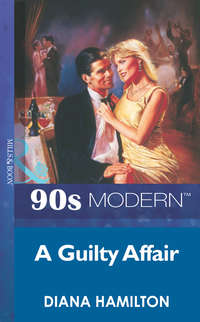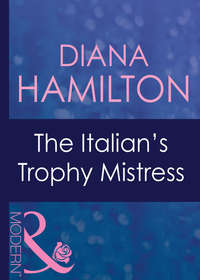
Полная версия
Greek Affairs: The Virgin's Seduction: The Virgin's Wedding Night / Kyriakis's Innocent Mistress / The Ruthless Greek's Virgin Princess


greek affairs The Virgin’s Seduction
The Virgin’s Wedding Night
Sara Craven
Kyriakis’s Innocent Mistress
Diana Hamilton
The Ruthless Greek’s Virgin Princess
Trish Morey

www.millsandboon.co.uk
The Virgin’s Wedding Night
Sara Craven
About the Author
SARA CRAVEN was born in South Devon and grew up surrounded by books in a house by the sea. After leaving grammar school she worked as a local journalist, covering everything from flower shows to murders. She started writing for Mills & Boon in 1975. Apart from writing, her passions include films, music, cooking and eating in good restaurants. She now lives in Somerset.
Sara has appeared as a contestant on the Channel Four game show Fifteen to One and is also the latest (and last ever) winner of the Mastermind of Great Britain championship.
CHAPTER ONE
‘WHAT do you mean—you can’t go through with it?’ Harriet Flint stared at the flushed defensive face of the young man on the other side of the table. ‘We have an agreement, and this lunch is to finalise the arrangements for the wedding. I’m relying on you.’
‘But things have completely changed for me now. You must see that.’ His mouth set stubbornly. ‘When we made the original deal, frankly I didn’t care what happened to me. The girl I loved was out of my life, so the chance of earning a bundle of cash and heading off round the world seemed a fair option.
‘But now Janie’s come back, and we’re together again, for good this time. We’re going to be married, and I’m not allowing anything to jeopardise that.’
‘But surely if you explained to her …’
‘Explain?’ Peter Curtis gave a derisive laugh. ‘You mean actually tell her that, while we were apart, I agreed to marry some total stranger—for money.’
‘Couldn’t you make it clear it’s not a real marriage—just a temporary arrangement for a few months—and on a strictly business footing. Wouldn’t that make a difference?’
‘Of course not,’ he said impatiently. ‘How could it? She’d never accept that I could be involved in something so bizarre. And even if she believed me, she’d think I’d gone stark raving mad, and I wouldn’t blame her.’
He shook his head. ‘So—I’m sorry, Miss Flint, but the deal’s off. I’m not risking her walking away from me again, because she’s all that matters to me. Surely you can understand that.’
‘And I have an inheritance that matters to me just as much,’ Harriet returned coldly. ‘And which I stand to lose if I can’t produce a husband before my next birthday. Clearly you’ve never understood that.’
She paused. ‘Consider this. Marriage is an expensive business, these days. I’m sure your Janie realises that. Surely you could persuade her that a tax-free lump sum is worth a small sacrifice, especially if I was able to manage an increase on the original fee.’
‘No,’ he said. ‘She wouldn’t see it that way at all. Why should she?’ He rose to leave, then paused, looking down at her, frowning a little. ‘For God’s sake, Miss Flint—Harriet—you don’t have to buy a husband. If you wore different clothes—did something to your hair—you could be quite attractive. So, why not tell yourself this was a lucky escape, and concentrate on finding some real happiness instead?’
‘Thank you,’ she said. ‘For the unsolicited advice. But I prefer to do things my way. And that does not involve harnessing my marginal attractions to some man. Not now—not ever. I prefer my career.’
‘Well, I can’t be the only one who answered your advertisement. Sign up one of the others.’
But you, she thought, were the only one that my grandfather would have believed in as my future husband. You’re his idea of the perfect clean-limbed, upstanding young Englishman. Judas Iscariot probably looked like you.
She watched him fumble for his wallet, then shook her head. ‘No, I’ll pick up the tab, along with the pieces of our agreement. You see, I’d have kept my word, right up to the moment the annulment was validated.
‘I hope you always feel you made the right decision,’ she added, smiling as he turned to leave. ‘And I wish you well.’
It wasn’t true, of course. She’d have liked to kill him. Him and his smug bitch of a girlfriend, who only had to crook her little finger, it seemed, to send all Harriet’s hopes into chaos.
And what the hell, she asked herself, as she watched him walk away, was she going to do now—with Grandfather’s ultimatum on one side, and this—gaping hole on the other?
Well, for this afternoon, at any rate, she would have to relegate her unexpected problem to the back of her mind. She had a tricky meeting, which would require some serious focussing.
She signalled to the waiter, who arrived, his eyes scanning her untouched plate of penne arrabiata with open distress.
‘There is something wrong with the food, signorina?’
‘Not at all,’ she assured him. ‘I—wasn’t very hungry, that’s all.’ Something killed my appetite stone-dead.
‘Quite attractive,’ she thought, smouldering. And then shook her head. How condescending was it possible to get?
She supposed that, in looks, she must take after her unknown father. Her hair was undoubtedly her best feature, brown as a horse-chestnut with auburn lights. And, if she’d permitted it to do so, it would have hung waving to her shoulders. Her eyes were clear and grey, and thickly lashed, but the rest of her face was totally unremarkable. So—if this had been Dad—what on earth had the blonde and ravishing Caroline Flint seen in such a man—unless, of course, he’d had oodles of charm.
If so, I missed out twice, Harriet thought cynically.
Not that she allowed it to trouble her. She had no wish to resemble her mother in either looks or temperament, so she’d been deeply riled by her grandfather’s on-going assumption that she couldn’t wait to kick over the traces and bring a double helping of dishonour on the family name.
Unlike Caroline Flint, she’d never shown the least inclination to indulge in a welter of short-lived and very public affairs with any man who took her fancy, married or single.
Not, she had to admit, that the opportunity had ever presented itself. She’d done a little perfunctory dating when she’d first arrived in London, but none of those encounters had ever developed as far as a full-blown relationship. Nor had she wanted it to happen. And recently there’d been nothing. Which was fine by her too.
She rose, suddenly impatient to be off, picking up her bag, and slinging the jacket of her dull black linen suit over her arm as she made her way across the restaurant to the desk at the front where Luigi the owner held sway.
Only, he was already occupied with a tall young man who’d just walked in off the street, while Harriet had been negotiating her passage between the crowded tables. And the street looked as if it was the place where he belonged, Harriet thought, resenting that she was being forced to wait in line. And by someone like this too.
Because torn jeans, worn-out trainers and a much faded tee shirt were hardly the fashion choices of Luigi’s usual male clientele. And the over-long, untidy dark hair, and thin, unshaven face hardly struck a reassuring note either.
In fact, by now, Harriet would have expected the newcomer to have been ushered politely but firmly to the door.
Only it wasn’t happening. In fact Luigi was all smiles and amiability and—dear God—actually reaching for his chequebook.
Paying him to go away? Harriet wondered with wry bewilderment. Luigi ran an excellent restaurant, but she’d never gained the impression before that he was a soft touch. Unless there was some more sinister implication to the visit, and the stranger was collecting for some kind of protection racket.
Her mouth twisted in swift self-derision. Don’t let your imagination gallop away with you, my dear, she adjured herself.
Besides, people like that probably don’t take cheques anyway.
While this particular payment was being accepted with alacrity, she noticed, and transferred to the shabby wallet taken from the back pocket of those terminally scruffy jeans.
A few quick words, a handshake, and then he was turning to go. For a moment Harriet found herself facing him, confusedly aware that, in spite of his outward dishevelment, which gave the disturbing impression that he’d just fallen out of bed and grabbed the first handful of clothing he saw, his face was cool and contained, the nose high-bridged, the mouth firm above a square chin. That, if not handsome, he was certainly—striking—maybe even downright attractive, his shoulders broad, and his body lean and muscular.
She was conscious too of his eyes, dark as a night sky, encountering her glance in turn, and brushing over her with total indifference as he went, and the restaurant door closed behind him.
For a moment, she felt oddly shaken, her hand going up almost defensively to smooth the collar of her white cotton shirt.
As if, she thought, it mattered what she looked like. As if she didn’t deliberately dress down every day of her life, wearing deliberately dull clothing, and dragging her hair relentlessly back from her face to be confined at the nape of her neck by an elastic band. Because, with her mother’s example never far from her mind, she was the last person in the world to want to attract a man’s attention or interest.
Especially one who looked like that, she thought tartly, pulling herself together and retrieving her credit card from her bag.
But Luigi’s good humour seemed to be universal today, and he waved away the proffered payment.
‘You ate nothing, Miss Flint, and you drank only water. Your friend did little better. I hope, on your next visit, you will have better appetites.’
By my next visit, I may well have lost my entire inheritance, Harriet thought bitterly, as she forced a grateful smile. And the friend in question will not be with me.
As she turned to go, Luigi halted her, his voice sinking confidentially. ‘That man who was just here—you observed him, I think, and must have wondered.’
To her annoyance, she felt herself flush. ‘It’s really none of my business …’
‘No, no, this will interest you, because you were the first to notice the picture and admire it.’ He gestured expansively at the expanse of pale lemon wall behind him. ‘I should have told him so.’
‘Told him?’ Harriet repeated slowly. She looked up at the framed canvas which had been hanging there for the past three weeks, and her brows snapped together in amazement. ‘You mean—he painted that?’
‘Si.’ Luigi nodded, his mouth quirking in amusement. ‘He looks the part, no? The struggling artist in his garret?’ Luigi shrugged. ‘Yet, he has talent. You yourself said so, signorina.’
Harriet looked back at the painting. It was all perfectly true, she acknowledged with silent reluctance. It had captured her attention, and her imagination, from the first moment she’d seen it. Yet it wasn’t the kind of thing that usually appealed to her.
At first glance, it was a relatively simple composition—clearly some Mediterranean scene with a cloudless sky above a crescent of beach, with the blue haze of the sea beyond. In the foreground was a small plateau of bleached and barren rock, flat and featureless, and on it was a table holding a half-empty bottle of wine and two glasses, one of which had overturned, sending a small trickle of liquid, rusty as dried blood, across the white metal surface. Just under the rock, half buried in the sand, was a woman’s discarded sandal, a fragile high-heeled thing. Nothing more.
It was a picture that asked questions—that invited speculation—but that hadn’t been its main appeal for Harriet. Then, as now, the heavy golden light that suffused it, burning and languid, had made her feel as if she was looking into the very essence of heat. That she could feel it searing her eyes, and scorching her skin, even through her layers of clothing.
And that was what had alerted her to the skill of the painter—what lifted the picture to a different dimension.
When she’d questioned Luigi initially, he’d shrugged and said it was an experiment. That he was featuring it to gauge the reaction of his customers.
And she’d looked back at it again, and said slowly, ‘I think—in fact I’m sure that it’s good—and that I like it very much.’ Adding, ‘If that means anything.’
Certainly it was as far removed from the rather conventional watercolour of Positano that had hung there before as it was possible to get.
At the same time, Harriet was aware that she’d always found the picture strangely disturbing. That, as well as the faint mystery of its subject matter, it seemed, in some way, to emanate an anger as tangible as the scrape of a fingernail on flesh.
Nevertheless, her eyes were instinctively drawn to it each time she came to the restaurant, and she invariably lingered for an extra moment at the desk to study it.
Now, on a sudden, inexplicable impulse, she said, ‘Is it for sale?’
He looked remorseful. ‘I regret—it has already gone. But he has other, very different work for which he wishes to find a market, and I have been able to send interested buyers to him. Also he accepts commissions.’
He paused. ‘But what he needs, signorina, is a patron—someone with contacts in the art world—an exhibition in a gallery to make him known.’
He delved under the desk and handed her a cheaply printed business card. It carried the single word ‘Roan’, and a mobile telephone number.
She studied it, wondering whether Roan was a given name or a surname. ‘Pretty basic.’
‘It is not easy when you are at the beginning of your career.’
‘I suppose not.’ She slipped the card into a side pocket of her bag, intending to dispose of it later. Asking about the picture had been a pure whim, coming at her from nowhere, and best forgotten.
Besides, right now she had her own struggles to contend with, she thought as she walked out into the sunlit street. And this state of deadlock with her grandfather was set fair and square centre-stage.
Harriet smothered a sigh as she began to walk briskly back to her office. She loved Grandfather—of course she did—and she owed him a hell of a lot, but she was under no illusions about him either.
Gregory Flint was a total flesh-eating, swamp-bound dinosaur. Tyrannosaurus Rex, alive and in person. He always had been, and he certainly saw no reason to change—not at his time of life, nor in his current state of health.
And, however preposterous his demands, it was unwise to shrug them off and hope he would forget, as she was now discovering to her cost.
She could only imagine the scene when her mother, eighteen and unwed, had defiantly announced that she was pregnant, that marriage to the father was out of the question, and that she would never agree to a termination. Could imagine too that the subsequent explosion would have rocked the Richter scale.
Certainly the news had created a breach that had caused Caroline Flint to be barred from the family home, especially when she’d refused to atone for her sins by giving the baby up for adoption. And it had been six years before contact was resumed.
‘Your grandfather wants to see you, darling,’ her mother had announced lightly one day. ‘Which means that the prodigal daughter is being given a second chance too. Wonders will never cease.’
Her partner at the time, an unemployed session guitarist called Bryn, had glanced up at her. ‘Don’t knock it, Princess. We could use a fatted calf.’
They went down to Gracemead the following day, and as the station taxi turned the corner in the drive, and the house lay in front of them, Harriet drew a breath of stunned, incredulous joy. Because it didn’t seem possible after the cheap flats she was used to that she could be even marginally connected with such a truly magical place.
In time, she’d come to see that Gracemead was not really beautiful. That her Flint ancestor, the wealthy Victorian merchant who’d taken a classic Georgian house and embellished it with a Gothic façade, before adding turrets at each end in imitation of his sovereign’s Scottish retreat at Balmoral, had actually been something of a vandal.
But, seeing it that first time as a confused and not always happy child, she gasped in wonder as the afternoon sun touched the windows, and flecked the stones with gold, telling herself it was a fairy palace, and that her mother must genuinely be the Princess that Bryn called her to have been born there.
The interview between Gregory Flint and his errant daughter was conducted in private. Harriet was whisked off to the kitchen by a plump, elderly woman who’d been Caroline’s old nanny, and plied with milk and small iced cakes with smiley faces that had been piped on to them by Mrs Wade, the cook-housekeeper.
When she eventually joined them, her mother was smiling too, but with a kind of rigid determination, and her eyes were red.
‘Such fun, sweetie. You’re going to stay here with Grandpa and have a wonderful time. Spoiled to death, I expect, don’t you, Nanny?’
‘Aren’t you staying too?’ Harriet asked in bewilderment, but Caroline shook her head.
‘I’ll be going with Bryn, darling. He has a marvellous tour of America coming up with a very famous singer. We’ll be away for ages, so it’s best that you’re here. It’s a wonderful place to grow up in,’ she added, the lovely face momentarily shadowed with something like regret.
And so it had proved, thought Harriet. Because she’d never actually lived with her mother again after that, seeing her only from time to time as someone whose visits became less and less frequent.
The house had become the constant in her life—had become her home. And that initial sense of wonder—almost of recognition—had never faded. She’d felt from the start that the place was reaching out to her to hug her—to soothe away any sense of abandonment she might feel. And she’d hugged it back, knowing that it was where she truly belonged.
Accustomed to London’s restrictions, she’d found Gracemead and its large grounds had provided her with a magical playground to explore for hours at a time. And Nanny and Mrs Wade had almost vied with each other to make sure she lacked for nothing to make her feel comfortable and secure.
Her relationship with her grandfather had taken rather longer to establish. He’d been awkward with her at first, taciturn and more than a little gruff. And sometimes she’d found him watching her as if he was puzzled about something. Then, one day, she’d heard one of the local ladies refer to her as ‘Poor Caroline’s little girl. You would never know, would you?’ and understood.
It was the day he’d found her in his book-lined study, deep in Black Beauty, twining a strand of hair round her finger as she read, that everything had changed between them.
She hadn’t realised immediately that she was no longer alone, and when she’d looked up and seen him watching her, she’d been apprehensive in case he was angry.
But his sudden smile had been strangely tender. ‘Your mother used to do that when she was reading,’ he told her. ‘And this was her favourite book too.’
He sat down in the big wing chair by the fireplace and began to talk to her, listening patiently to her halting replies, and encouraging her to be less shy, and say whatever was on her mind.
Looking back, Harriet could even say with honesty that she’d had a pretty good childhood in spite of her mother’s continuing and prolonged absences. There’d been postcards at first, and letters from the States, then from Europe, after the relationship with Bryn had finally crashed and burned like all the others, and Caroline had joined up with a professional tennis player, not quite in the top rank.
Eventually, as the years had passed, the letters had become fewer, then dried up altogether. At the last contact—a card for her twenty-first birthday—Caroline had seemed to be in Argentina living with a former polo player. But no address had been included, and since then there’d been nothing to indicate whether her mother was alive or dead.
Harriet had come to accept over the years that her mother lived solely on her own terms, and that the existence of her child belonged to a long-discarded past. She was left to remember only Caroline’s beauty and zest for life, however misplaced, and to try and forget the negative elements of their relationship. At the same time, however, her life with her grandfather, though never lacking in affection, grew marginally trickier.
Gregory Flint was clearly determined that Harriet was not going to follow in her mother’s footsteps if there was anything he could do to prevent it. Accordingly, Harriet found her life controlled by a kind of benevolent despotism, her freedom restricted and her judgement regularly called into question.
And the fact that she could—almost—understand why it was happening made it no less irksome.
The first major clash between them had come when she was eighteen, and had just left her convent school, and he’d announced he’d found her a place in a Swiss establishment where she would improve her foreign language skills, and embark on a cordon bleu cookery course.
She’d stared at him open-mouthed. ‘You mean I’m going to be finished? Gramps, you can’t mean it. Anyone would think we were living a hundred years ago.’
His brows snapped together. ‘You have some other idea?’
‘Well, of course.’ She tried her most winning smile. ‘I’ve decided to join the family business. Carry on the Flint name for another generation.’
‘You—want to work for Flint Audley?’ He gave a harsh laugh. ‘And where did this ridiculous notion spring from, I wonder?’
‘It seems an obvious choice,’ she countered.
‘Well, it’s not obvious to me,’ he said scathingly. ‘What on earth do you think you know about property management on the scale we deal with? Dealing with our range of tenants, contracts, maintenance—the thousand and one issues you’d be faced with? You—a chit of a girl just out of school?’
‘I’d know about as much as you and Gordon Audley did when you started out in the fifties.’ Harriet lifted her chin without flinching. ‘And certainly as much as Jonathan Audley with his 2:2 in Fine Arts,’ she added, her tone edged. ‘Yet he seems to have been welcomed with open arms—even by you. I could run rings round him, given the chance.’
She paused. ‘Because I’m not just “a chit of a girl” as you claim. I’m a chip off the old block, and all I want is an opportunity to prove myself.’ She added more quietly. ‘I—I thought you’d be pleased.’
‘Then you can think again, and quickly too.’ His voice was cutting. ‘I have very different plans for your future, my girl.’
‘Yes, I know. Polite French conversation halfway up some Alp.’ She shook her head. ‘Gramps, darling, it would never work. I’d be so bored. And you know what they say about idle hands,’ she added unthinkingly, and saw his face harden into real anger.
‘Is that a reference to your mother?’
She bit her lip. ‘No, I promise it’s not.’ Although maybe things might have turned out differently for her if she’d been allowed to have a real job—a career from the outset—instead of being expected to stay at home, the dutiful daughter. Perhaps that original love affair was her first chance to be herself. To make a choice, even if it was the wrong one …








